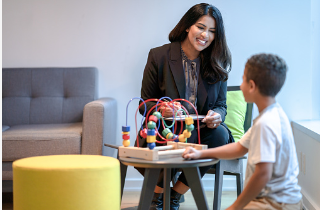Speech Development FAQs
As a Speech-Language Pathologist (SLP), the most common question I am asked by caregivers is “When should ___ sound come in?”. There is lots of information out there on speech sound development. Below is information in one place and in a caregiver-friendly format.

What is the difference between speech and language?
Speech refers to the production of sounds that make up spoken words. It’s also referred to as articulation. Language refers to words we use and how we use them to express thoughts, meaning, and ideas.
What causes speech sound disorders?
The exact cause is unknown. It most likely isn’t linked to one contributing factor. The two most common risk factors are:
- Recurrent ear infections in early childhood
- A parent or sibling that has/had a speech sound disorder
What should we do if a child says sounds incorrectly?
The most important thing to do is to model the sound/words correctly. You can restate the word to the child while emphasizing the sound they produced incorrectly. Do not imitate what the child is saying. Sometimes adults think it’s cute to imitate how a child mispronounces words and even add it to everyday vocabulary. This will only reinforce their incorrect productions.

What should we do if we have concerns about a child’s speech or language development?
Find a Speech-Language Pathologist (SLP) to complete a full speech/language evaluation. The SLP will determine if your child’s speech and language skills are within normal limits or recommend therapy to address needs.
Will speech sound disorders go away on their own?
Sounds develop at different ages (see charts for expected ages). The age of acquisition varies by sound based on ease of sound production, if sounds are visible (ex. sounds produced with lips such as /b/ and /p/), and where they are produced in the oral cavity.
Sometimes sounds emerge a little more slowly. You may notice that your child can say the sound in some words but not all, or that your child can imitate the sound in words that you model. This could be an indication the sound is emerging on its own.
While it is possible for speech sound disorders to resolve on their own with time, it is best for the child evaluated by a Speech-Language Pathologist (SLP). The SLP can determine if there is a true speech sound disorder or if the speech sounds are emerging on their own.

What can I expect during a full speech and language evaluation?
Before the evaluation, the Speech-Language Pathologist (SLP) will gather as much information as possible about the child’s birth and developmental history as well as caregiver/teacher/pediatrician concerns. Depending on the setting, the SLP may do a hearing screening or full hearing evaluation. The SLP will also do an oral mechanism examination (oral-mech), or oral peripheral examination (oral-periph), to look at the structure, function, and appearance of the child’s speech mechanism (lips, teeth, tongue, jaw) to make sure everything is adequate for speech production.
The SLP should also complete formal and informal measures to assess speech, expressive language (how child expresses self), and receptive language skills (what child understands). All findings should be documented in a report and shared with you. If speech therapy is recommended, goals should be written. If other concerns are noted during the evaluation, the SLP may recommend further speech/language testing or evaluations by related disciplines such as a Physical Therapist (PT).
